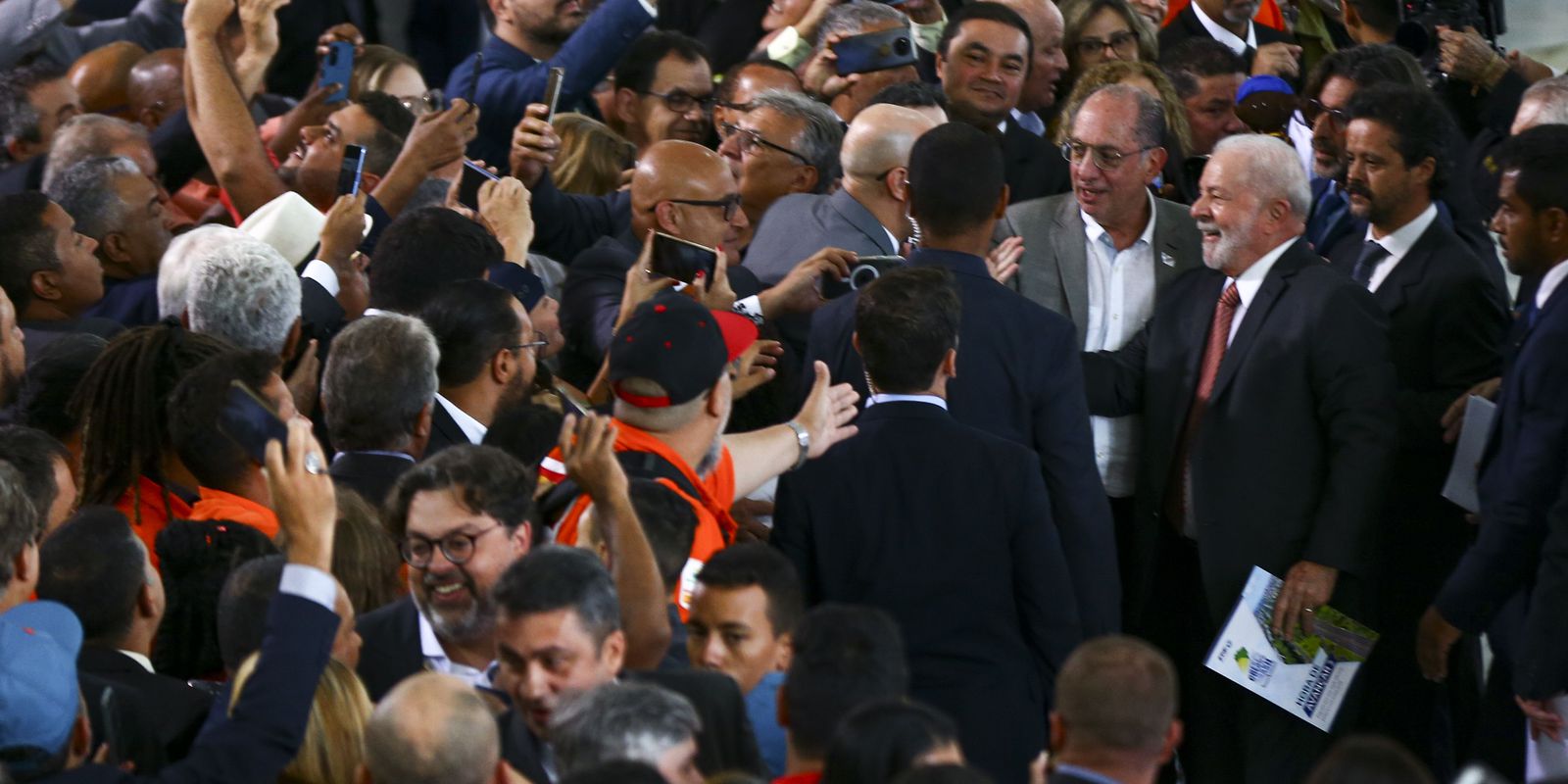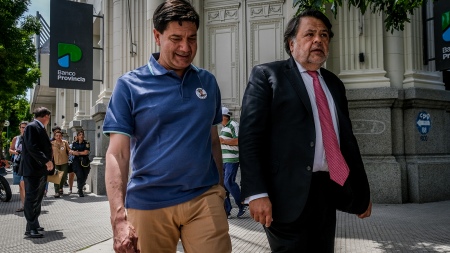President Luiz Inácio Lula da Silva instituted today (18) a working group to prepare a proposal dealing with the Minimum Wage Appreciation Policy, which will bring a permanent calculation formula for the national floor. In a meeting with around 500 trade unionists at the Planalto Palace, Lula said that the minimum wage needs to rise in line with the growth of the economy, equivalent to the increase in the Gross Domestic Product (GDP, sum of goods and services produced in the country).
“We have already proved that it is possible to raise the minimum wage above inflation. And the minimum is the best way to distribute income in this country. It is no use for GDP to grow if it is not distributed. The GDP has already grown 14% a year in that country and the worker has become poorer. Because if the GDP grows and the owner of the company is left alone, whoever made the GDP grow does not earn anything, which is the Brazilian worker”, said the president.
“That’s what you have to do to improve this country. We cannot remain an emerging, developing country forever,” she added.
The group was created based on an order signed this Wednesday by the president and will have 90 days to complete the work. The ministries of Labor and Employment, Finance, Planning and Budget, Social Security, Development, Industry and Commerce, and the General Secretariat and Civil House of the Presidency are part of it. According to Lula, the trade union centrals will also be heard for the construction of the proposal.
“I am inviting the trade union movement, representing Brazilian workers, to help the government build a new relationship between capital and work and a new relationship of rights for the working people, because we deserve to be treated with respect and justice” , said Lula.
“The world of work has changed, it is necessary to modernize, reinvent itself at the level of union structure, that is why we are going to create a negotiation commission with unions, government and businessmen”, highlighted the president.
The Minister of Labor and Employment, Luiz Marinho, stressed that the new policy for the minimum wage will be made by the government as a whole, and respecting the predictability of the economy.
“Predictability is important for the business community, for mayors, for governors, for the federal government, for the institutions of the economy, so that we can do what we did in President Lula’s first government, which is to increase purchasing power. of the minimum wage maintaining inflation, maintaining the fiscal balance. There is no pen, there is understanding building, ”he said.
According to the minister, two other working groups will also be created by the end of February, on collective bargaining and the strengthening of unions and on the regulation of work through applications.
“We follow the anguish of app workers who often have to work 14 hours, 16 hours a day to be able to take bread and milk home. This, in my concept of work, borders on slave labor. Here, application companies, platform companies, don’t be scared. There is nothing special here, except for the purpose of valuing work and providing social protection”, said Marinho.
Negotiations
The union centrals defend that the federal government applies the valuation policy according to the terms agreed in 2007 and abandoned in 2019. With that, the floor should be R$ 1,343, contemplating the inflation measured by the National Consumer Price Index (INPC) – previously estimated at 5.8% in 2022 -, plus the Gross Domestic Product growth of 2 years before – 4.6% in 2020.
According to the Brazilian Institute of Statistical Geography (IBGE), the INPC officially accumulated in 2022 is 5.93%.
For the president of the Central dos Trabalhadores e Trabalhadores do Brasil (CTB), Adilson Araújo, predictability and permanent appreciation of wages are central elements for the reconstruction and transformation of Brazil.
“To those who try to impose fiscal responsibility against social responsibility in the debate, fiscal responsibility cannot be the cost of mistreating poor people, people who suffer from food insecurity. The fiscal cost needs to be a combined effort by a backward Brazil, but one that has a debt and needs to build a pact with its people, which presupposes the constitution of a policy that not only restores inflation, but above all allows for real gains with an increase in GDP variation”, he said.
“This matters a lot for the lives of 60 million Brazilians and increases and moves the economy”, argued Araújo. “We have to fight the good fight. The minimum wage debate cannot be guided by the God of the market [mercado financeiro]. Those who depend on the minimum wage are those who can no longer do the supermarket. We have to bet on a policy that is closer to the aspirations of our people”, she added.
Currently, the minimum wage is R$ 1,302, according to provisional measure edited in mid-December by the previous government. This value considers the INPC variation plus a real gain of approximately 1.4%.
However, the value approved by the National Congress in the General Budget of the Union of 2023 is R$ 1,320, but, to take effect, it depends on a new provisional measure by the Executive. The government’s concern is with the lack of resources to pay for the new amount.
Despite the fact that the Constitutional Amendment of the Transition guaranteed R$ 6.8 billion for the minimum wage of R$ 1,320, the strong release of retirement and pensions from the National Social Security Institute (INSS) in the last months of last year could result in a larger-than-expected fiscal impact. Several social and labor benefits, such as unemployment insurance, PIS/Pasep allowance, the Continuous Cash Benefit (BPC) and others, are also linked to the national floor and must be corrected.
According to preliminary calculations by the economic team, the government would need another R$ 7.7 billion to readjust the value in January. In this case, resources could come from reallocating money from other ministries.
In a recent statement, the Minister of Finance, Fernando Haddad, said that there was no breach of campaign promise of President Lula. “President Lula’s commitment is a real increase [para o salário mínimo], which has already happened. The current minimum wage is 1.4% higher than accumulated inflation since the last readjustment,” she said.
According to the Inter-Union Department of Statistics and Socioeconomic Studies (Dieese), in December 2022 the minimum wage needed to meet the basic needs (food, housing, clothing, education, hygiene, transportation, leisure and social security) of a family of four should be BRL 6,647.63.
Other guidelines
During the event with President Lula, the unionists also presented other labor demands, such as the regulation of work in applications, the valuation of collective bargaining, the strengthening of the Ministry of Labor, the readjustment of the Income Tax table, the repeal of norms for the recovery of labor rights, the creation of a national plan for professional training, the improvement and balance of working conditions for women and blacks, and the cancellation of privatizations.
In addition to Araújo, from CTB, the president of the Central Única dos Trabalhadores (CUT), Sérgio Nobre; the president of Força Sindical, Miguel Torres; the president of the General Union of Workers (UGT), Ricardo Patah; the president of the New Workers Union Central (NCST), Moacyr Roberto Tesch Auersvald; the president of the Central dos Sindicatos Brasileiros (CSB), Antonio Neto; the president of Intersindical Central Sindical, Nilza Pereira; the vice president of Central Pública, Hugo René; the president of Intersindical Instrumento de Lutas, Emanuel Melato; and the president of CSP-Conlutas, Luiz Carlos Prates.
In April of last year, the trade union movement also delivered to Lula, still as a pre-candidate for the Presidency, the Agenda of the Working Class, central unit documentapproved at the Working Class Conference (Conclat).















